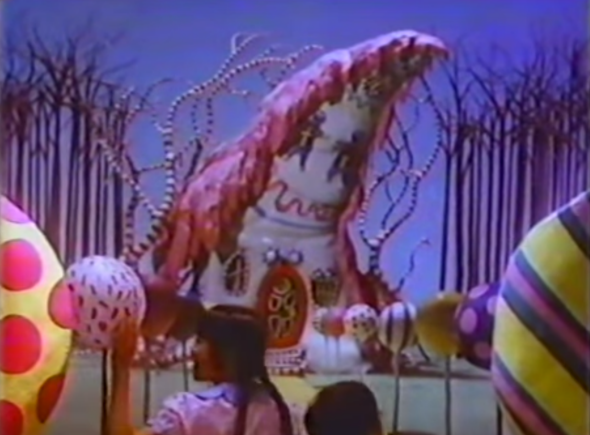Back in 1982, Tim Burton didn’t fit in at Disney. He was a talented 24-year-old animator who worked on movies like The Fox and the Hound and Tron, but he was sometimes frustrated without the creative freedom to pursue his own visions. There were a few exceptions: The 1982 short Vincent, the 1984 short Frankenweenie, and, in between, his bizarre adaptation of Hansel and Gretel, which aired only once, on the Disney Channel at 10:30 p.m. on Halloween 1983.
For years there were rumors that Hansel and Gretel was lost, or even that it never existed—10:30 p.m. wasn’t exactly the children’s network’s prime slot. But it was dusted off at last for the Museum of Modern Art’s 2009 retrospective on Burton, and this week it’s finally surfaced online.
It’s not difficult to see why a company like Disney buried the short. Burton’s aesthetic was already remarkably well-formed in 1982, and the short is packed with Burton signatures: spirals, candy stripes, big eyes with pinpoint black pupils, white-and-black makeup, odd German Expressionist angles, and spindly creatures that would fit right in beside Jack Skellington. But above all it’s unafraid to mix the childish and the disturbing in a way that’s unmistakably Burtonesque and not very Disney. There are creepy clowns, references to child abuse, and there’s even a gingerbread man who seems like he might be shot to resemble a child predator. Burton also cast Japanese actors, and the short culminates in a kung fu showdown in which the witch does a flying kick into her own oven.
The low-budget short doesn’t all work—it was Burton’s first time working with live actors, and the performances suffer—but it’s remarkably imaginative when it does, and it also offers an interesting glimpse into Burton’s mind at the time. As an animator at Disney struggling to obtain the creative freedom he wanted, Burton may have related to the children and their father, who are forced to slave away making toys but never allowed to play with them. Burton was eventually fired from Disney, after Frankenweenie proved once again too dark for their taste, and Burton finally got his big break with 1985’s Pee Wee’s Big Adventure with rival Warner Bros. Burton has of course since returned to work with Disney, on movies like The Nightmare Before Christmas (though Disney released that one through Touchstone), Alice in Wonderland, and finally a remake of Frankenweenie. Depending on what you think of those movies, and how dark you like your fairytales, you could call that a fairytale ending.
